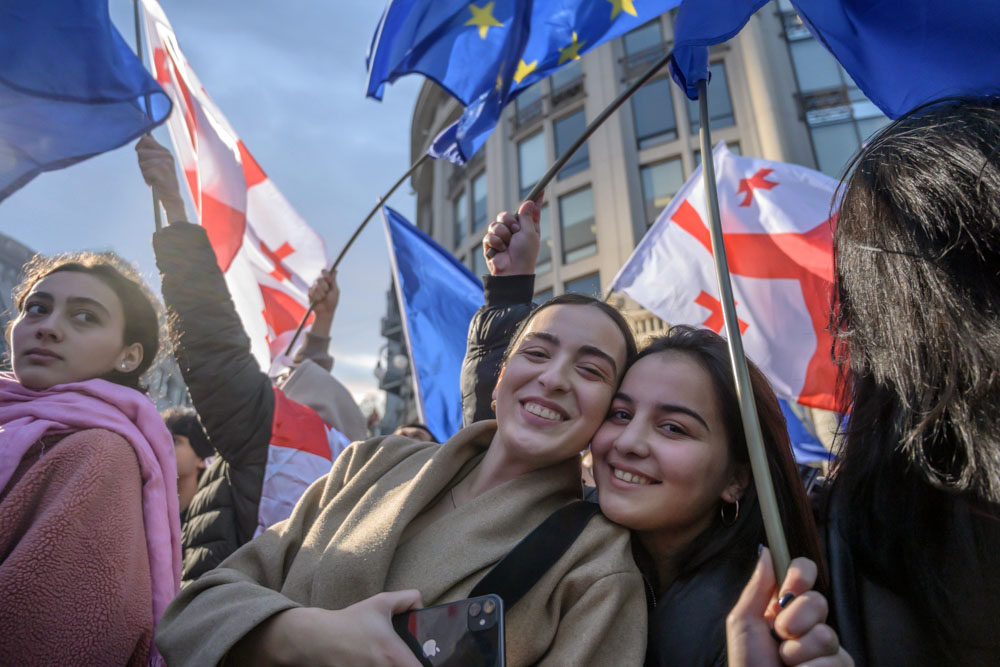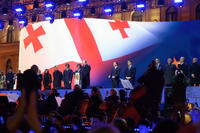
Celebrations in Tbilisi on 15 december 2023 © Onnik James Krikorian/OBCT
On December 14, the European Council granted EU candidate status to Georgia. An important step, celebrated the following day in the capital Tbilisi, both by the authorities and the population. However, the path towards the EU still remains ahead
Last week, six months shy of marking a decade since signing its Association Agreement with the European Union, Georgia received its long-awaited EU candidate status. The move came after Ukraine and Moldova received their candidate status a year and a half earlier, following an EU decision to fast-track all three countries after the Russian invasion. For most Georgians, this was a dream come true.
Despite the disparity between the decisions concerning the three countries, European Council President Charles Michel described the landmark decision as emotional and powerful. “It will change the face of EU for the coming years and decades [and] it will also will change the reality for the countries in question”, he said in a press conference held after the EU Summit where the decisions were taken last week. Ukraine and Moldova will now enter accession talks.
Though actual membership might take decades, that symbolism was important, sending “a very important message to Russia”, Director of the Regional Institute of Security Studies in Tbilisi Natia Seskuria told France 24. Others also recognised that. “Never ever did I think it might happen like this — like getting a diploma without real knowledge”, Vano Chkhikvadze, EU integration programme manager at the Open Society Georgia Foundation, said to POLITICO.
Tbilisi had been instructed to work on twelve outstanding areas of concern but only managed to meet three. This likely leaves the remaining points hanging before Tbilisi can enter its own negotiations with Brussels. Nonetheless, the hilltop broadcasting tower and a bridge across the Kura (Mtkvari) river in the Georgian capital were lit up in the EU flag, something not uncommon since the country’s Euro-Atlantic aspirations were enshrined in the constitution under former President Mikheil Saakashvili.
The current government had already announced a celebration ahead of the decision, and the following evening thousands packed Tbilisi’s Freedom Square, where EU Ambassador to Georgia Pawel Herczynski gave a speech alongside Prime Minister Irakli Garibashvili, Parliamentary Speaker Shalva Papuashvili, Georgian Dream Chairman Irakli Kobakhidze, and Tbilisi Mayor Kaka Kaladze.
“December 14 will be forever etched in the history of Georgia as a day of jubilation, marking the well-deserved triumph of the proud and honourable Georgian nation, marking the well-earned success of the Georgian people”, Garibashvili told the crowd. “Today, Georgia proudly stands as a European nation”. In turn, Kobakhidze said the status became a reality 11 years ago when Georgian Dream founder Bidzina Ivanishvili “laid the foundation” at the same location to replace “Soviet-style authoritarianism” with “European-style democratic and fair governance”.
That was seemingly a reference to the previous United National Movement (UNM) government headed by Saakashvili. Indeed, the promotional film that started the large celebration on Friday made no reference to the now imprisoned former leader or the current now largely ceremonial president, Salome Zourabichvili, or her predecessor Giorgi Margvelashvili, who were not invited on stage.
Following the speeches by government members and diplomats, Zourabichvili was however present on the connecting Rustaveli Avenue, where film crews followed her as she walked through a crowd of people in an attempt to gain some visibility as the official event on Freedom Square ended with a concert. Dozens of pedestrians stopped her constantly to pose for selfies with the nominal head of state, who recently faced impeachment procedures for making unauthorised trips to European capitals to lobby for EU membership.
Though independent, Zourabichvili had previously been supported by the government for the position in 2018. Despite the bad blood between them, she applauded the decision, and so did even the most ardent opposition figures and civil society actors. It was a “monumental milestone” for the country and she thanked the EU saying “recognition echoes the steadfast determination of the Georgian people – a will that remains unshaken across generations”.
She also noted that being granted membership candidate status reflected the wishes of a majority of Georgian citizens, but would not have occurred without the “relentless dedication and arduous struggle” of the Ukrainian people in the war with Russia.
Meanwhile, many took to social media as if the country had actually become an EU member. While the euphoria from both sides last week was understandable, the chasm between the sides remains a concern for decision-makers in Brussels, especially as Georgia heads into parliamentary elections late next year. For now, however, there is at least a new potential opportunity for dialogue and cooperation.
Photogallery
blog comments powered by








